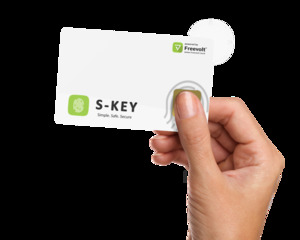

|
Edward Lowton
Editor |


|
| Home> | Premises management/maintenance | >Security | >Rethinking access security for workplace vehicles |
Rethinking access security for workplace vehicles
06 October 2023
Biometric authentication is now used widely for everything from passport control to personal device security. It’s even possible to protect workplace vehicles like forklifts using a simple fingerprint access card, explains Gonzalo de Gisbert

MANY OF the vehicles used in logistics, warehousing and production environments are a significant investment for the business. Acquisition, maintenance and operation costs of this machinery can be substantial, and it is essential that operators are sufficiently trained to ensure safe and efficient use.
But how do you ensure that only the person trained and authorised to use specific vehicles has access to them? Handing over a key or security card may not protect you from an unauthorised user, who might then cause injury or damage.
How do you control access to vehicles?
In an ideal world, your employees would drive only the machinery they are trained to use. All machinery is safer in the hands of skilled operators, and your business will work more efficiently if only those who are authorised use relevant plant and machinery.
Historically, organisations have relied on the possession of a physical ignition or start-up key to control who drives workplace vehicles. This includes everything from heavy plant machinery to industrial vehicles, including forklifts, towing and lifting vehicles and trucks. Some may use a ‘tap and go’ pass card to control access to vehicles, perhaps with an added method of authentication such as a password or PIN to further restrict access. However, none of these methods is secure.
Do keys and cards secure vehicle access?
We know that keys or cards can easily be handed to others in the workplace, and since there is no further authentication this means untrained operatives might have access to your forklift. There is also the risk that keys or cards can be lost or stolen, exposing you to even greater risk of unlawful access until the locks are changed or cards cancelled.
Even adding a password or PIN to a security card does not give you proof that the person using it is the approved individual. Known as two-factor authentication, the possession of a card or key plus knowledge of a code does improve access control, but it leaves open the possibility that the code may be observed and copied, and users may default to simple or repeated combinations.
Changes in the workplace since the pandemic, including staff changes and hybrid work patterns, have also led to an increased risk that unauthorised individuals using your workplace vehicles may not be challenged. Security staff and other employees may no longer be able properly to recognise and identify authorised operatives, inadvertently allowing access when it should be denied.
Using biometrics to protect against unauthorised access
So, how do you protect machinery such as forklifts and other vehicles from being used by unauthorised personnel? Thankfully the evolution of biometric access control offers a simple, secure solution.
Biometric authentication relies on the unique biological characteristics of individuals to verify their identity. It is a zero-trust model which requires the individual to be present every time, so removes at a stroke the risk of lost or stolen credentials.
Thanks to the recent growth in biometric authentication for personal devices such as mobile phones, and passports, biometric identification is today readily accepted as a secure and convenient means to prove identity. The user experience is smooth and quick, and employers and operatives alike can have confidence in the level of security offered by biometric authentication.
Fingerprint access control on a card
Fingerprint technology is now available on access control cards, allowing organisations to define exactly who may use which piece of equipment. The user simply presses their finger against a built-in fingerprint reader on the card, which then verifies to the card reader that the individual is qualified and cleared to use that machinery - or denies access.
Access control hardware is widely available in the workplace, already in use for door security and even for access to electronic machinery. Access control security card company Freevolt has developed their smart S-Key fingerprint access card to communicate with a broad range of existing NFC (near field communication) / 13.56 MHz RFID devices, so these fingerprint access cards can be used with any existing card readers on vehicles right out of the box.
A growing number of vehicle manufacturers are now looking to incorporate card-reading devices into their products, knowing that fingerprint access control cards provide a simple but secure way to ensure the safe operation of these vehicles.
The added benefits of biometric access control cards
Introducing fingerprint authenticated access control cards to vehicle use can bring a number of added benefits to your business:
- Positive identification of the vehicle user means only skilled, trained operatives have access, so health and safety requirements are met.
- Access to the equipment can be tracked, allowing accurate time and mobility data to be logged - helpful for payroll, efficiency modelling, fuel management and even the allocation of fault or damage.
- The system is cost-effective to set up: freely connects with existing NFC readers and a wide range of potential in-vehicle hardware.
- Works with existing card printers, lanyards etc. as biometric access control cards match usual card dimensions
- Fast, easy enrolment of authorised users onto your system, and minimal ongoing maintenance or replacement time or cost
- Contactless access control protects your workforce from the potential exposure to germs and viruses, keeping them healthy.
Personal data protection
Where smart cards contain personal information that can be transferred to other devices and harvested, the individual’s personal data is at risk. However, innovative biometric access control cards such as S-Key keep any personal data literally in the user’s hands.
S-Key cards never transfer personal data, nor does your organisation store or use the biometric data. The user simply adds their fingerprint to their own card, where it is securely stored. That information never leaves the card. S-Key cards use innovative Freevolt technology to harvest enough energy from the card reader to allow the card to check the presented fingerprint immediately against its securely stored template. The only information communicated to the card reader is a simple confirmation or denial of access.
The fact that the employer is not holding this personal fingerprint data simplifies privacy management and GDPR reporting, whilst providing reassurance to the employees that their personal information is safe in their own hands.
Sustainable vehicle access control
Sustainable biometric access control cards are leading the way. S-Key’s sustainable solution is designed to be scalable, and does not require the replacement of existing card reading hardware. It relies on a pay-per-card system, and can work in conjunction with existing card readers to improve security for specific vehicles.
Versatile S-Key access cards are also future-proof, since they are able to communicate with a wide and developing range of NFC/13.56 MHz devices.
Even access control cards themselves are becoming more sustainable. S-Key’s fingerprint access cards require no battery, so will not require the regular replacement we have come to expect - nor the disposal of expired cards and batteries.
Integrated security solution
The need for organisations to control access to their physical premises, machinery and software is growing as the risks of breach increase. Proper security measures demanding positive authentication of every individual will become the norm, giving access to everything from vehicles and machinery to computer systems and even canteen vouchers.
Biometric fingerprint authentication provides this vital additional security layer with minimal additional cost. Fingerprint access cards such as S-Key can give you peace of mind that your vehicles will only be used by properly-trained personnel, reducing a number of potential risks to your business. More broadly, biometric access control systems can work to protect both your organisation and your team, improving business and personal security in a single package.
Gonzalo de Gisbert is head of product and business development at Freevolt Technologies
For more information:
Tel: 0203 176 2350
- Recognise air pollution as an occupational health hazard, says BSC
- BEMS makes ESG energy reduction easy as IoT
- EEF re-launches as Make UK
- The PPErfect equipment for staying out of harm’s way
- COP 26: UK "lacks plan for manufacturing" says industry group
- UK lighting manufacturer strengthens cybersecurity
- Sculpteo's 3D printing expertise used to develop drone solutions
- British companies failing at basics of IT security
- Bale shortages hamper plastics recycling
- Improving railway rolling-stock maintenance




















